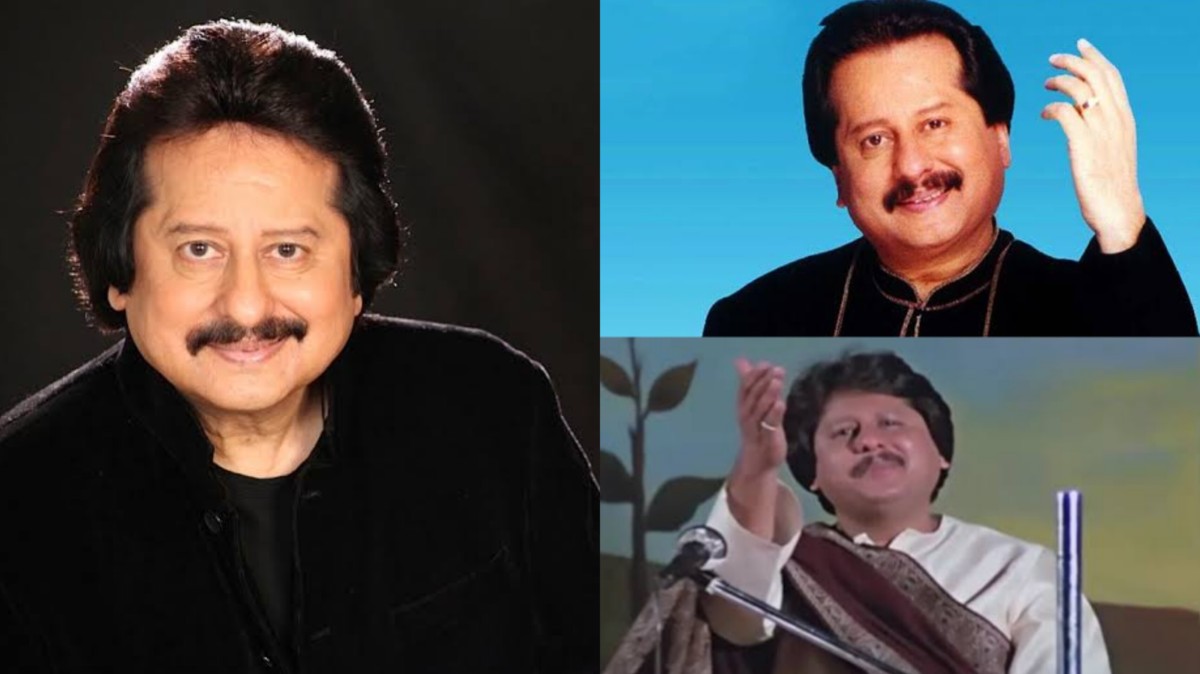
Revisiting the evergreen songs of Pankaj Udhas – Beyond Bollywood
Though primarily a Ghazal singer, Udhas made a mark in playback singing and in Indian pop space too.
By Mayur Lookhar
Ghazal is a dying art. It suffered another body blow as Pankaj Udhas passed away due to prolonged illness. He was 72. Hailed as one of the last ghazal singers from the golden era, Udhas’ death is a huge blow to the genre, both across India and Pakistan.
Hailing from a privileged background, Udhas and his elder brothers Manhar, Nirmal are all singers. In a career spanning over 40 years, Udhas first achieved recognition when he crooned Aye Mere Watan Ke Logo, [originally sang by Lata Mangeshkar], at an event to honour the sacrifices of Indian soldiers during the Sino-Indo war of 1962.
He didn’t eye a career in Ghazal music per se. He first plied his skills in playback music for the dud film Kamna, the movie released later in 1982. During this period, he developed an interest for Ghazals, learning Urdu. The 70s-80s is deemed as a golden era for Ghazal music, across India and Pakistan. Talat Mahmood, Ghulam Ali, Jagjit Singh, Mehdi Hassan ruled the genre. Breaking into this elite space was nigh impossible. The only way to make a mark was by creating his own niche. His good looks, soft tone made him likable. Udhas’ ghazals shone for their simplicity thereby making it appealing to both classes and masses alike.
His first album Aahat [1980] was a hit and there was no looking back. The Talat Mahmood, Ghulam Ali, Mehdi Hassan, Jagjit Singh fans didn’t change loyalties as Pankaj Udhas merely added to the ghazal buffet.
Having established himself as a Ghazal singer, Udhas later pursued playback singing, famously singing the somber number Chitthi Aayi Hai. He cashed in on the pop era too, churning out few fine romantic numbers. Plus, he also experimented a bit in the devotional music space. He believed in encouraging new talents, and rather surprisingly, he gave a young model John Abraham his first break by having him as the leading face of his album Mahek [1999]. Abraham has never shied from calling Udhas his mentor.
Much like his soft voice, Udhas was a gentleman. We last saw him at the historic press conference of ISRA [Indian Singers Rights Association] in April, 2023. Udhas was initially unrecognizable as he wore a mask. He was thanked for making it to the historic day despite not being in good health. It reflected his good nature of being there for the people of his fraternity. Back then, most were unaware of his illness. After a long battle, he succumbed to it on 26 February in Mumbai.
Udhas’ death has naturally left his dear ones, and legion of fans sad, but he leaves behind a rich legacy of music. We recollect some of his eternal songs. Kindly note, they are in no specific order.
Chandi Jaisa Rang Hai Tera [1984]
Arguably, the most mesmerizing ghazal of his career. Though named Udhas (sad in Hindi), this ghazal had joy written all over it. Not many ghazals can beat the chivalry that you will find in these words, and the romantic tone of Udhas. Here is a ghazal for all ages.
Aap Jinke Kareeb Hote Hai – Tarrannum [1981]
Aap jinke kareeb hote hai, woh bade khushnaseeb hote hai (The people that are close to you are so lucky). You are soaked into the music, the voice that one loses sight of a certain envy in its lyrics. How can this ghazal not strike a chord with millions of people who only gauge at their crush, but never have the courage to bare their feelings. You don’t need to say anything. Simply send this timeless ghazal and s/he would get the message.
Ghungroo Toot Gaye
The Muhammad Aurangzeb (popularly known as Qateel Shifai) poem, Mala Begum crooned original song Ke Ghungru Tut Gaye was made for the Pakistani film Naaz [1969]. Years later, Udhas would turn this into a ghazal. Those were the days when Indian artistes took inspiration, often calling their version a tribute. With all due respect to the original creators, but perhaps, they, too, would have silently admired Udhas’ rendition of their classic song. A man expressing a woman’s feelings, ah it’s always beautiful. That opening ghungroo tone sets the mood for a blissful experience.
Zara Ahista Chal – Mu-Kar-Rar [1981]
A Mumtaz Rashid-penned true gem from the album Mu-Kar-Rar. It’s raining pain, but still walk slow. Philosophy was seeped into every verse of this ghazal. Abke logon mein wafa hai kam! (Don’t expect much loyalty from people today). Phew, that one line was enough to seep deep into the human conscience. Despite the despair, the tone of Udhas provided eternal hope.
Sabko Maloom Hai – Mu-Kar-Rar
What’s a ghazal singer without mehkashi (boozing). Udhas had his fair share of intoxicating ghazals.
The Sabko Maloom Hai song became an excuse for alcohol lovers to justify their boozing. Everyone knows, I don’t drink, but what I can do if someone offers one. The nasha here though was more of love. As he famously crooned in the antara, there’s love in every vein of mine. Can any alcohol beat this intoxication?
Sharab Cheez Hi Aisi
It’s hard to leave alcohol, it’s as addictive like your lover. Udhas made it clear with the Sharab Cheez Hi Aisi ghazal.
Thodi Thodi Piya Karo
Though he loved his intoxicating ghazals, the maestro also cautioned his fans to not become an alcoholic. Sharab has got dearer, so drink in small quantity. Wonder though, if his fans truly followed this advice.
Sach Bolta Hoon Main – Humnasheen [1997]
And here’s Udhas telling the universal truth. Need we say more?
Peene Walo Suno – Hasrat [2005]
After all these years, one may have thought that Udhas must have got tired of the mehkashi music. No, the ghazal maestro had a new message. Mix love with alcohol and it’s a deadly combination. Not many women may like their man drinking in front of them, but if the latter plays this ghazal, she might not object. The lucky ones might even get to share a drink with her.
Niklo Na Benaqab – Nayaab [1985]
This track might be deemed misogynist in a free, democratic environment today. Hey, but the devoted Islamists often fight for their right to naqaab. In the 80s, however, Niklo Na Benaqab was a rage. Personally, we’re against any veil, but there is no harm in tuning to this timeless classic from the album Nayaab. Interestingly, Udhas named one of his daughters Nayaab.
Chitthi Aai Hai – Naam [1986]
Udhas’ rise as a ghazal singer was hard to ignore for Hindi film industry too. Filmmaker Mahesh Bhatt offered him a song in Naam [1980]. The rest is history. Udhas not only crooned the classic Chitthi Aayi Hai song, but he also performed in the film. The emotional song triggered a sense of nostalgia especially for those who are away from their dear ones. Fair to say, it moved all desis, especially the NRIs [Non-Resident Indians].
Jeeye To Jeeye Kaise – Saajan [1991]
The early 90s was a period where romantic musicals banked on Nadeem-Shravan music to emerge hit. Lawrence D’Souza’s Saajan [1991] was a rage in equal breath. How could Nadeem-Shravan not tap into the talent of Pankaj Udhas. The Jeeye To Jeeye Jaise track reminds you why it’s impossible to live without true love.
Ahista – Stolen Moments [1998]
The mid 90s was the dawn of Indian pop. Bollywood was still the preferred destination. Ghazal music was in its descent. Pankaj Udhas sensed the potential of pop music, a medium to connect with the then youth. It introduced us to Sameera Reddy and a white man. Shot in Australia, the song showed us a foreigner falling in love with an Indian woman. Though a ghazal maestro, Udhas regaled in the soft music, offering listeners an altogether new experience.
Chupke Chupke – Mahek [1999]
A year later, Udhas would give a young model named Farhan his first break. He would later go on to be known as John Abraham. The album was Mahek with the Chupke Chupke track being the most popular one.
Usually, one mentions the first works early, but we chose to end this listicle with a couple of delightful ghazals from Udhas’ maiden album Aahat. Enough said, simply feel the pusle of the timeless ghazals.
Kehta Hai Kaun Khwab Ki Tabeer – Aahat [1980]
Suraj ki Har Kiran – Aahat
Publisher: Source link
